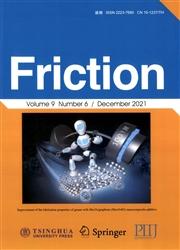利用具有软约束和硬约束的物理信息神经网络 (PINN) 解决包括质量保证空化在内的雷诺方程的新方法
IF 6.3
1区 工程技术
Q1 ENGINEERING, MECHANICAL
引用次数: 0
摘要
本文章由计算机程序翻译,如有差异,请以英文原文为准。
A new method to solve the Reynolds equation including mass-conserving cavitation by physics informed neural networks (PINNs) with both soft and hard constraints
求助全文
通过发布文献求助,成功后即可免费获取论文全文。
去求助
来源期刊

Friction
Engineering-Mechanical Engineering
CiteScore
12.90
自引率
13.20%
发文量
324
审稿时长
13 weeks
期刊介绍:
Friction is a peer-reviewed international journal for the publication of theoretical and experimental research works related to the friction, lubrication and wear. Original, high quality research papers and review articles on all aspects of tribology are welcome, including, but are not limited to, a variety of topics, such as:
Friction: Origin of friction, Friction theories, New phenomena of friction, Nano-friction, Ultra-low friction, Molecular friction, Ultra-high friction, Friction at high speed, Friction at high temperature or low temperature, Friction at solid/liquid interfaces, Bio-friction, Adhesion, etc.
Lubrication: Superlubricity, Green lubricants, Nano-lubrication, Boundary lubrication, Thin film lubrication, Elastohydrodynamic lubrication, Mixed lubrication, New lubricants, New additives, Gas lubrication, Solid lubrication, etc.
Wear: Wear materials, Wear mechanism, Wear models, Wear in severe conditions, Wear measurement, Wear monitoring, etc.
Surface Engineering: Surface texturing, Molecular films, Surface coatings, Surface modification, Bionic surfaces, etc.
Basic Sciences: Tribology system, Principles of tribology, Thermodynamics of tribo-systems, Micro-fluidics, Thermal stability of tribo-systems, etc.
Friction is an open access journal. It is published quarterly by Tsinghua University Press and Springer, and sponsored by the State Key Laboratory of Tribology (TsinghuaUniversity) and the Tribology Institute of Chinese Mechanical Engineering Society.
 求助内容:
求助内容: 应助结果提醒方式:
应助结果提醒方式:


